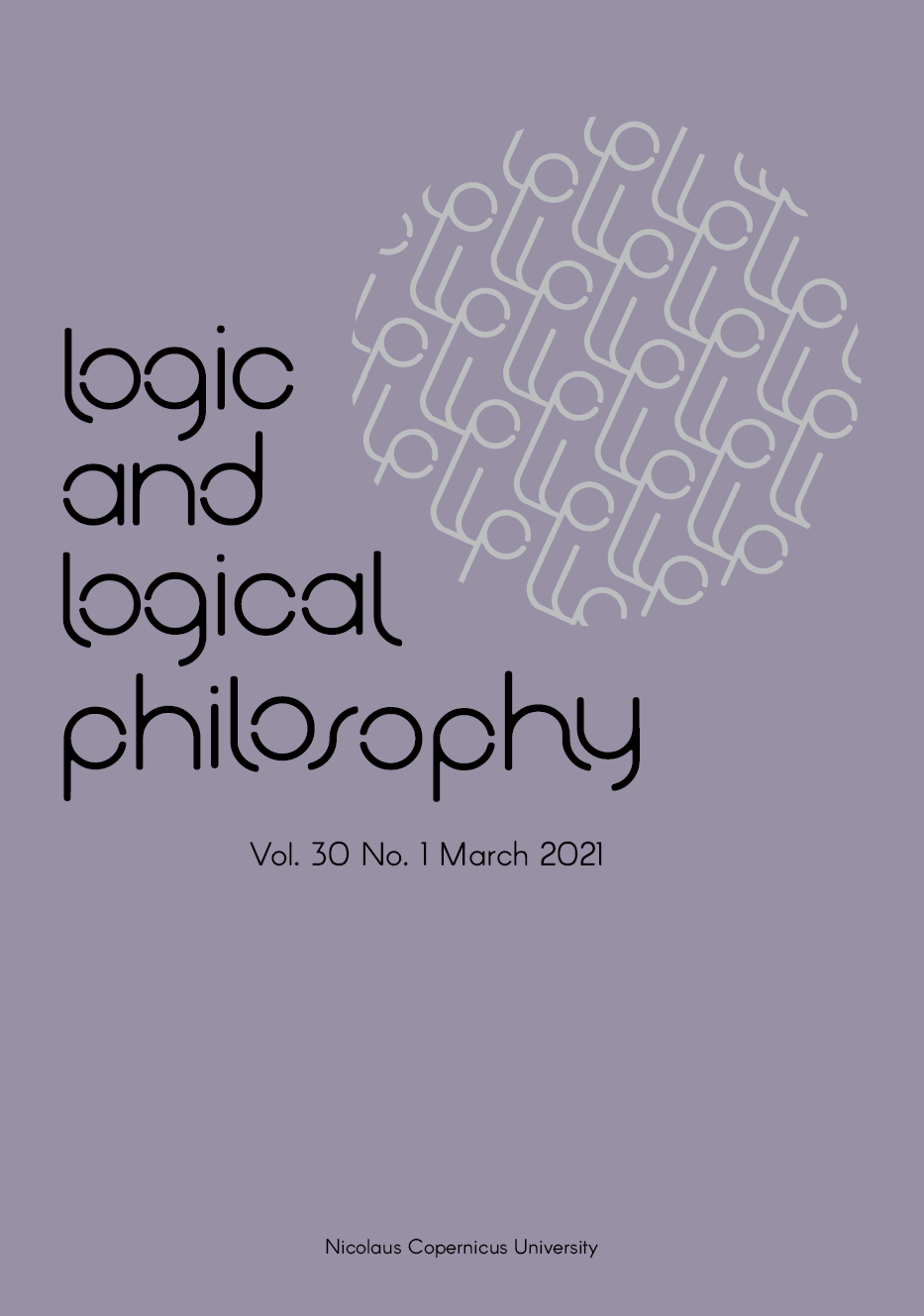The Modal Logic LEC for Changing Knowledge, Expressed in the Growing Language
DOI:
https://doi.org/10.12775/LLP.2020.012Keywords
epistemic logic, the logic of change, S4.3 knowledge, current and stably knowledge, growing language, perfect recall, no learningAbstract
We present the propositional logic LEC for the two epistemic modalities of current and stable knowledge used by an agent who system-atically enriches his language. A change in the linguistic resources of an agent as a result of certain cognitive processes is something that commonly happens. Our system is based on the logic LC intended to formalize the idea that the occurrence of changes induces the passage of time. Here, the primitive operator C read as: it changes that, defines the temporal succession of states of the world. The notion of current knowledge concerns variable components of the world and it may change over time. We represent it by the primitive operator k read as: the agent currently knows that, and assume that it has S5 properties. The second type of knowledge, symbolized by the primitive operator K read as: the agent stably knows that, relates to constant components of the world and it does not change. As a result of the axiomatic entanglement of C, K and k we show that stable knowledge satisfies axioms of S4.3. K and k modalities are not mutually definable, stable knowledge implies the current one and if the latter never changes, then it comes to be stable. The combination of K and k with the idea of an expanding language allows questioning of the so-called perfect recall principle. It cannot be maintained for both types of knowledge just because of changes in the vocabulary of the agent and possibly the growing spectrum of possible states of the world. We interpret LEC in the semantics of histories of epistemic changes and show that it is complete. Finally, we compare our logic with selected epistemic logics based on the concept of linear discrete time.
References
Fagin, R., and J.Y. Halpern, “Belief, awareness, and limited reasoning”, Artificial Intelligence 34 (1987): 39–76. DOI: http://dx.doi.org/10.1016/0004-3702(87)90003-8
Fagin, R., J.Y. Halpern, Y. Moses and M. Vardi, Reasoning About Knowledge, Cambridge, MA: MIT Press, 1995.
Halpern, J.Y., R. Van Der Meyden, and M.Y. Vardi, “Complete axiomatizations for reasoning about knowledge and time”, SIAM Journal on Computing 33, 3 (2004): 674–703. DOI: http://dx.doi.org/10.1137/S0097539797320906
Hintikka, J., Knowledge and Belief: An Introduction to the Logic of the two Notions, Ithaca, 1962.
van der Hoek, W., “Systems for knowledge and belief”, Journal of Logic and Computation 3, 2 (1993): 173–195. DOI: http://dx.doi.org/10.1093/logcom/3.2.173
Hendricks, V.F., and R.K. Rendsvig, “Hintikka’s knowledge and belief in flux”, pages 317–337 in H. van Ditmarsch and G. Sandu (eds.), Jaakko Hintikka on Knowledge and Game-Theoretical Semantics, 2018. DOI: http://dx.doi.org/10.1007/978-3-319-62864-6_13
Łyczak, M., “The logic of modal changes LMC”, Journal of Applied Non-Classical Logics, 30, 1 (2020): 50–67. DOI: http://dx.doi.org/10.1080/11663081.2020.1717267
Łyczak, M., “Belief changes and cognitive development: Doxastic logic LCB”, Axiomathes (2020; available on-line). DOI: http://dx.doi.org/10.1007/s10516-020-09486-8
van der Meyden, R., and K. Wong, “Complete axiomatizations for reasoning about knowledge and branching time” Studia Logica 75 (2003): 93–123. DOI: http://dx.doi.org/10.1023/A:1026181001368
Stalnaker, R., “On logics of knowledge and belief”, Philosophical Studies 128, 1 (2006): 169–199. DOI: http://dx.doi.org/10.1007/s11098-005-4062-y
Świętorzecka, K., (2008), Classical Conceptions of the Changeability of Situations and Things Represented in Formalized Languages, Warsaw: CSWU Publ. House, 2006.
Świętorzecka, K., and J. Czermak, “Some calculus for a logic of change”, Journal of Applied Non-Classical Logics 22, 1 (2012): 1–8. DOI: http://dx.doi.org/10.1080/11663081.2012.682435
Świętorzecka, K., and J. Czermak, “A logic of change with modalities”, Logique et Analyse 232 (2015): 511–527.
Witzel, A., “Characterizing perfect recall using next-step temporal operators in S5 epistemic temporal logic”, Journal of Logic and Computation 22, 3 (2012): 405–416. DOI: http://dx.doi.org/10.1093/logcom/exr010
Downloads
Published
How to Cite
Issue
Section
Stats
Number of views and downloads: 928
Number of citations: 0







